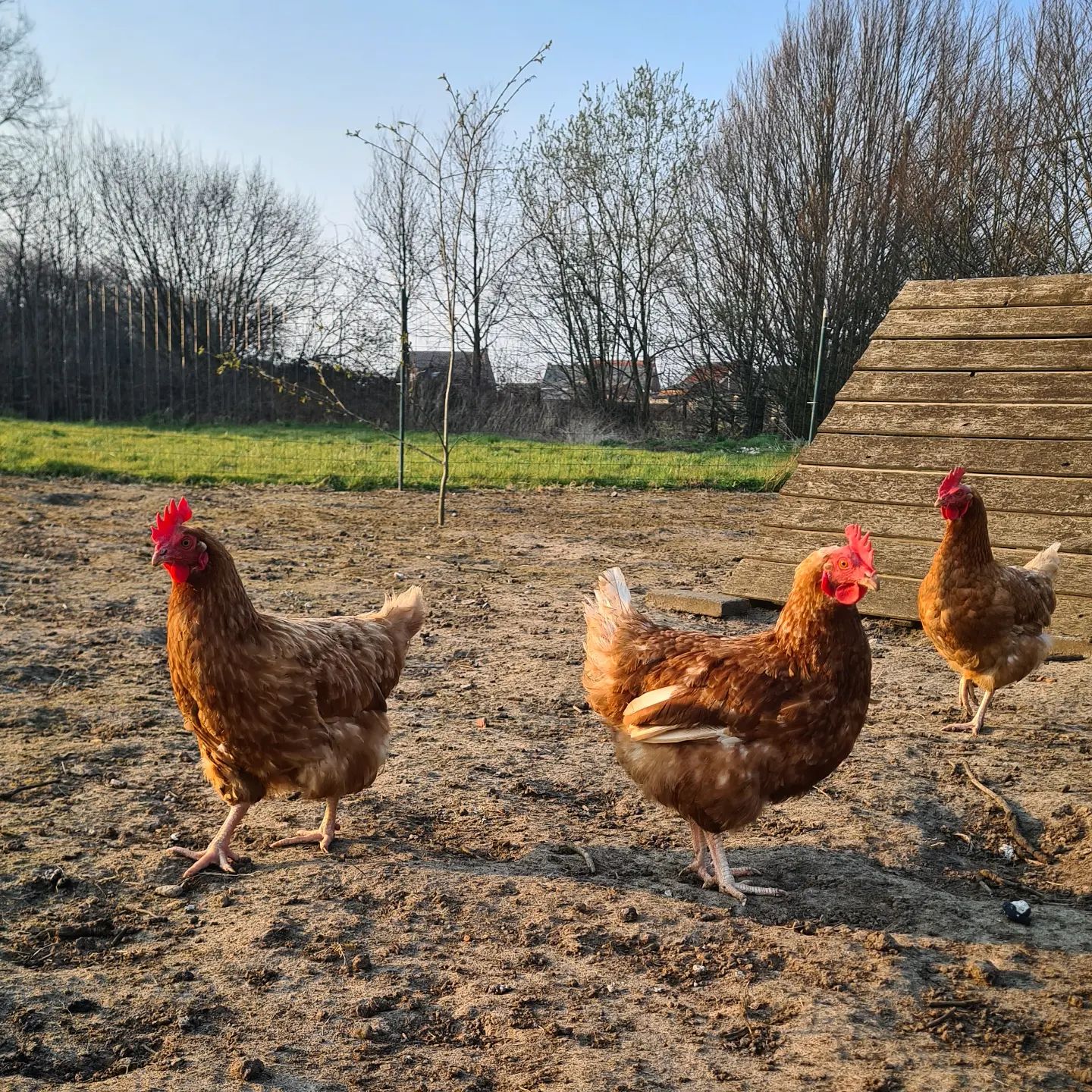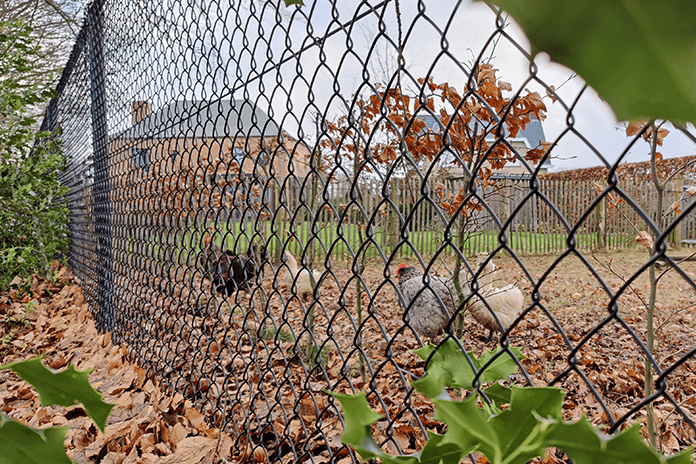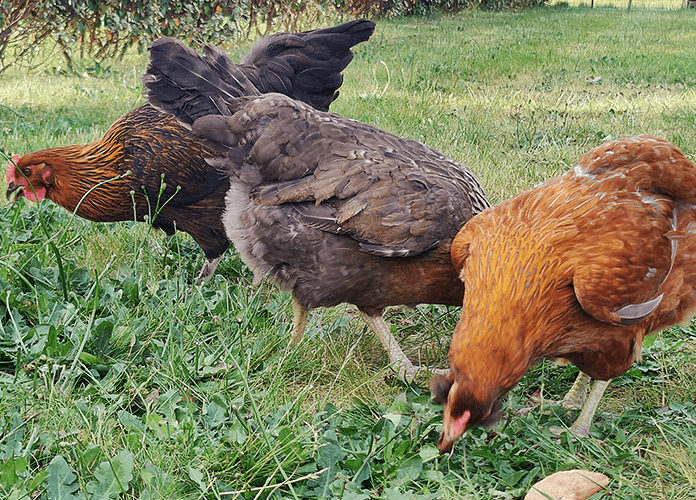10 Great Ways To Keep Chickens Out Of The Garden

Chickens can be real Houdini’s. They jump or flap over the fence and wander off to your neighbor’s backyard or vegetable garden. Or maybe you’re not a chicken owner but get some unwanted visitors from time to time, destroying your plants.
There are many humane, easy, and straightforward ways to keep your chickens inside the run or prevent them from a neighborly visit.
Let’s find out how to keep chickens out of the garden.
- Place higher fencing
- Cover the run
- Don’t free-range them
- Choose the right breeds
- Install gravel lanes
- Place chicken-repellant plants
- Install chicken wire
- Unlearn their habits
- Install electrical fencing
- Attractive vs unattractive gardens
1. Place higher fencing
If you don’t want your birds to escape their run, you must do everything possible to prevent this from happening. If you have some chicken Houdinis on your hands, the first step is to increase the height of your fencing. Most people don’t realize that many chicken breeds can fly, although not very far or for a long time. Depending on the chicken breeds you are keeping, you need to adjust the height of the fencing.

Some chicken breeds, like Silkies or Orpingtons, don’t need a high fence; they can not fly or jump high. But some breeds are flightier, like Marans, Araucanas, or Serama chickens. The general rule is to provide a minimum of 6 feet of fencing; you can expand to 8 feet if your chickens are eager to escape.
When you have a ‘frequent flyer’ on your hands, it’s easier to cover the chicken run with netting or hardware cloth instead of increasing the height of the fencing.
2. Cover the run
Not only is covering the run a great way to keep predators out of the chicken coop or prevent wild birds from eating all the feed, but it’s also a great solution to prevent escape artists from flapping over the fence. This method keeps your chickens inside the run at all times.
There are plenty of materials to choose from for netting to cover the run, depending on your budget and ease of maintenance. You can use mesh bird netting, hardware cloth, chicken wire, or roofing materials in plastic,… If your chickens still manage to escape with high fencing and a covered run present, you need to inspect the fencing for holes.

3. Don’t let your chickens free range
In our opinion, if you have the space, free-ranging your chickens bring many advantages. They’ll be happiest and healthy, wandering around all day, looking for bugs, and eating weeds. Free-ranging chickens don’t need to be commercially fed as much as those kept in captivity, and they always return to the coop by themselves at dusk.
However, not all environments are suited to free-range your chickens. When living in a suburban neighborhood with many neighbors close by, you don’t want your hens to wander off to their backyards. Chickens aren’t very polite creatures; they’ll destroy your neighbors’ flowers, eat all the vegetables from the garden, and scratch out plants. A small quarrel can quickly escalate into a considerable neighbor dispute.
You’ll get the best of both worlds by keeping your chickens inside the run at all times but still providing them plenty of space. Your flock will still be happy in their habitat, and the neighbors won’t have any troubles with your birds.
Always remember that some chicken breeds are better suited to suburban environments than others.
4. Choose the right breeds
Choosing suitable breeds is key, depending on the area you live in and the size of your backyard. Some chicken breeds are docile, some are loud, and others are flighty and need plenty of space. If you have a particular breed in mind, check out our ‘Breeds‘ page and read everything there is to know about your preferred chicken type.
We’ll address the most common docile chicken breeds, but most small chicken breeds, except Serama chickens, are suited to keep in a small backyard or suburban neighborhood.

Our top 10 docile chicken breeds suited for smaller gardens or suburban neighborhoods:
- Silkies
- Orpington (big chicken, needs space, but docile)
- Cochin
- Australorp (big chicken, needs space, but docile)
- Faverolles
- Polish
- Frizzle chickens
- Plymouth Rock
- Ayam Cemani
- Cinnamon Queen
Some breeds are known to be flighty or loud and are, therefore, less suited for suburban areas.
Breeds to avoid when living in a suburban neighborhood:
The temperament of the chicken can obviously differ from hen to hen, even when they are the same breed. Plenty of chicken owners keep Rhode Island Red chickens in a densely populated area without any trouble. But it’s better to be safe than sorry and be on the lookout for a gentle and docile breed instead of a loud or flighty breed.
5. Install gravel lanes
It probably won’t surprise you, but chickens prefer soft mushy underground instead of gravel or concrete. They love to scratch their feet in the dirt, and soft grass feels much nicer than hard stones. If a hedge separates the border between you and your neighbor, throw gravel between the bushes. Chickens won’t like the feel, and if they don’t know what they’re dealing with, they probably stay far away from it.
Instead of gravel, you can make the borders in concrete or brick stones. Some chickens still like to dig in gravel, but honestly, ours never do that; they don’t like the feel of it. If you don’t want them to trespass, make sure to make it as uncomfortable as possible with concrete, gravel, or brick stones.

6. Place chicken-repellant plants
Chickens are omnivores, meaning they’ll eat just about anything, meat, plants, and grains,… But they won’t touch some plants and vegetables; chickens don’t like the smell, taste, or texture. Planting the proper flora between you and the neighbors will prevent your chickens from trespassing on other gardens.
Be careful not to plant toxic plants when owning chickens; however, they probably won’t touch them. Plenty of examples of poisonous plants can be found online; make sure only to choose plants that won’t harm your hens but that you’re sure they won’t eat from them or be repelled by them.
Our favorite chicken-repellant plants:
- Bamboo
- Ferns
- Jasmin
- Creeping thyme or mint
- Trailing rosemary
7. Install chicken wire
Sometimes the solution to your problem is not too hard to find. By making your neighbor’s garden slightly less accessible, your chickens won’t take the trouble of wandering off. Especially more heavy breeds like Jersey Giants or Orpingtons are becoming less interested when they have to make a little more effort.
You’ll discourage your chickens from paying them a visit by simply installing some chicken wire between your garden and your neighbors. Especially when your flock has plenty of space in your own garden, it won’t tickle their interest anymore.
Remember that chicken wire can keep chickens inside a run but isn’t suited to keep predators out. The material isn’t strong enough, and predators will chew through it.
8. Unlearn their habits
Chickens aren’t the most intelligent animals on the planet, but they can be taught and trained to unlearn unwanted behavior like dogs or cats. You can try various methods like rewarding them when they do good or scaring them off if they do wrong. Teach them that food and treats are only available at your place, and they’ll be better off in your garden than the neighbors.

Some repellant systems are available on the market for those persistent chickens that keep visiting the neighbors. For example, you can install a motion-sensor sprinkler system. Once your chickens cross a specific place in the backyard, it’ll activate and sprinkle water where the chickens are. This way, they won’t be too frightened but prefer a different environment to roam around and will walk away.
After some time, they’ll remember where they’re not supposed to be and avoid the place altogether. Be careful not to use repellant systems that frighten or hurt your chickens.
9. Install electrical fencing
By installing electrical fencing, you’ll keep your chickens inside the run or garden and keep predators away. It’s a bit of an investment, but you can find reasonably priced electric fence systems. This system is also about breaking a habit, like in the last topic we discussed, but it also protects your flock from unwanted guests.
Remember to only buy electrical fencing for small animals, not for horses or other large livestock. You don’t want to hurt your chickens only to unlearn the escaping behavior. Make sure the shock the fencing gives is harmless to small animals.
Another advantage of installing electric fencing between you and your neighbor is that every pet stays in its own backyard. If your neighbors have a dog, it’s in both best interests to keep the chickens and the dog separated at all times. That way, you can even split the cost of installing an electric wire system.
10. Attractive vs. Unattractive Gardens
As said before, chickens are omnivores; they’ll eat about anything, weeds, plants, vegetables, grass,… They won’t wander off far if they find your garden more interesting than the neighbor’s. Try to make the garden as attractive as possible. Install dust baths, let the weeds grow, and provide a place where they can scratch the soil for bugs and worms.
Obviously, your neighbor’s yard can still look much more interesting than yours; this is something to keep in mind as you can’t decide what other people’s gardens look like. If they keep trespassing and messing up your neighbor’s garden, you’ll need to take extra precautions and install some fencing.
Summary
There are numerous ways to keep chickens out of your backyard or prevent your flock from visiting the neighbors. You’ll already solve most issues by not letting them free-range and adequately securing the run. But suppose you insist on letting your chickens roam during the day. In that case, there are many things to keep in mind to keep them in your own backyard, like planting chicken-repellant plants, making your garden more interesting than your neighbors, and installing electric fencing. Whatever you choose, make sure not to scare away the chickens or hurt them. Good luck!






















